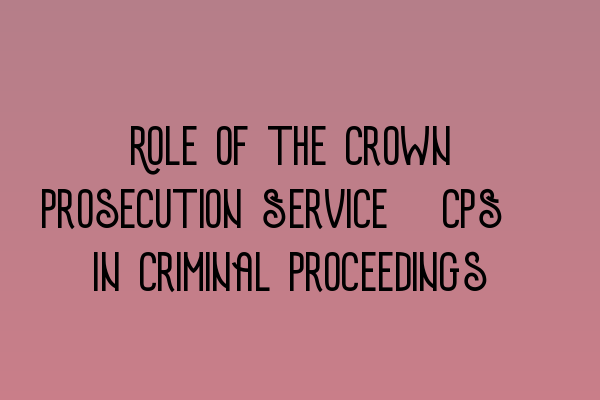Role of the Crown Prosecution Service (CPS) in Criminal Proceedings
In the criminal justice system of the United Kingdom, the Crown Prosecution Service (CPS) plays a vital role in bringing criminal cases to court and ensuring that justice is served. As the principal public prosecuting agency, the CPS has a significant impact on the outcome of criminal prosecutions. In this blog post, we will explore the role of the CPS in criminal proceedings and its importance in upholding the rule of law.
What is the Crown Prosecution Service?
The Crown Prosecution Service is an independent body responsible for prosecuting criminal cases in England and Wales. It was established under the Prosecution of Offences Act 1985 and operates under the direction of the Director of Public Prosecutions (DPP). The CPS works closely with the police, courts, and other criminal justice agencies to ensure that cases are prepared and presented effectively.
The CPS has the power to decide whether a case should proceed to court and what charges should be brought against the defendant. This decision-making process is guided by the Code for Crown Prosecutors, which sets out the legal tests and evidential requirements for charging a person with a criminal offence.
Key Functions of the CPS
The CPS has several key functions in the criminal justice system:
- Case review and decision-making: One of the primary responsibilities of the CPS is to review cases referred to them by the police and make a decision on whether to prosecute. This involves carefully examining the evidence, considering the public interest, and ensuring that the case meets the legal criteria for prosecution.
- Evidence presentation: The CPS plays a crucial role in presenting the evidence in court. Crown prosecutors, who are legal professionals employed by the CPS, work closely with the police and other agencies to gather and analyze evidence, interview witnesses, and prepare the case for trial. They present this evidence before the court to secure a conviction.
- Legal guidance and advice: The CPS provides legal guidance and advice to the police and other investigative agencies. They assist in clarifying legal issues, interpreting statutes, and ensuring that investigations are conducted in accordance with the law.
- Victim support: The CPS is also responsible for ensuring that victims of crime receive the necessary support and assistance throughout the criminal justice process. They work closely with victim support organizations to provide information, advice, and assistance to victims and witnesses.
Importance of the CPS in Criminal Proceedings
The role of the CPS in criminal proceedings cannot be overstated. Here are a few reasons why the CPS is crucial to the justice system:
- Fair and impartial decision-making: The CPS acts as an independent arbiter, ensuring that decisions to prosecute are based on the merits of the case and not influenced by political or other external factors. This helps maintain public trust in the justice system.
- Effective case management: The CPS plays a vital role in case management, ensuring that cases are prepared thoroughly and presented efficiently. By working in conjunction with the police and other agencies, they ensure that evidence is gathered and presented effectively, thereby increasing the likelihood of successful prosecutions.
- Protection of victims and witnesses: The CPS is responsible for safeguarding the interests of victims and witnesses, ensuring their rights are respected and that they feel supported throughout the legal process. This is essential in promoting confidence in the justice system and encouraging the reporting of crimes.
- Upholding the rule of law: By prosecuting those accused of committing criminal offences, the CPS plays a crucial role in upholding the rule of law and maintaining social order. This acts as a deterrent to potential offenders and reinforces the notion that no one is above the law.
Conclusion
In summary, the Crown Prosecution Service is a vital component of the criminal justice system in England and Wales. Its role in reviewing cases, presenting evidence, providing legal guidance, and supporting victims and witnesses ensures the fair and effective prosecution of criminal offences. As an independent and impartial body, the CPS plays a crucial role in upholding the rule of law and ensuring that justice is served. If you want to learn more about criminal law and preparation for SQE exams, check out our related articles: SQE 1 Practice Exam Questions, SQE 1 Practice Mocks FLK1 FLK2, SQE 2 Preparation Courses, SQE 1 Preparation Courses, SRA SQE Exam Dates.
